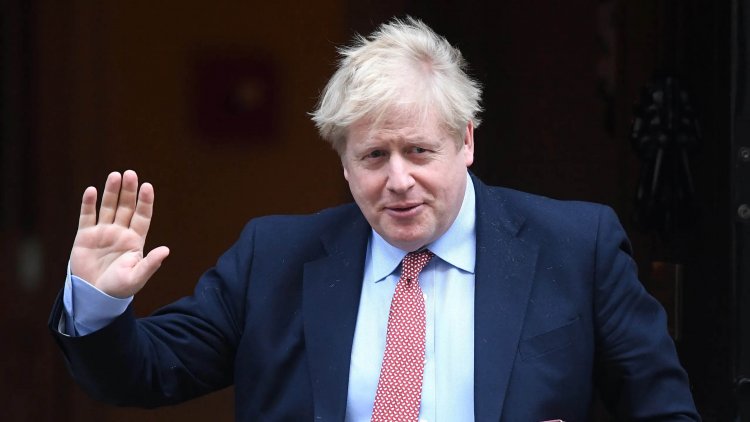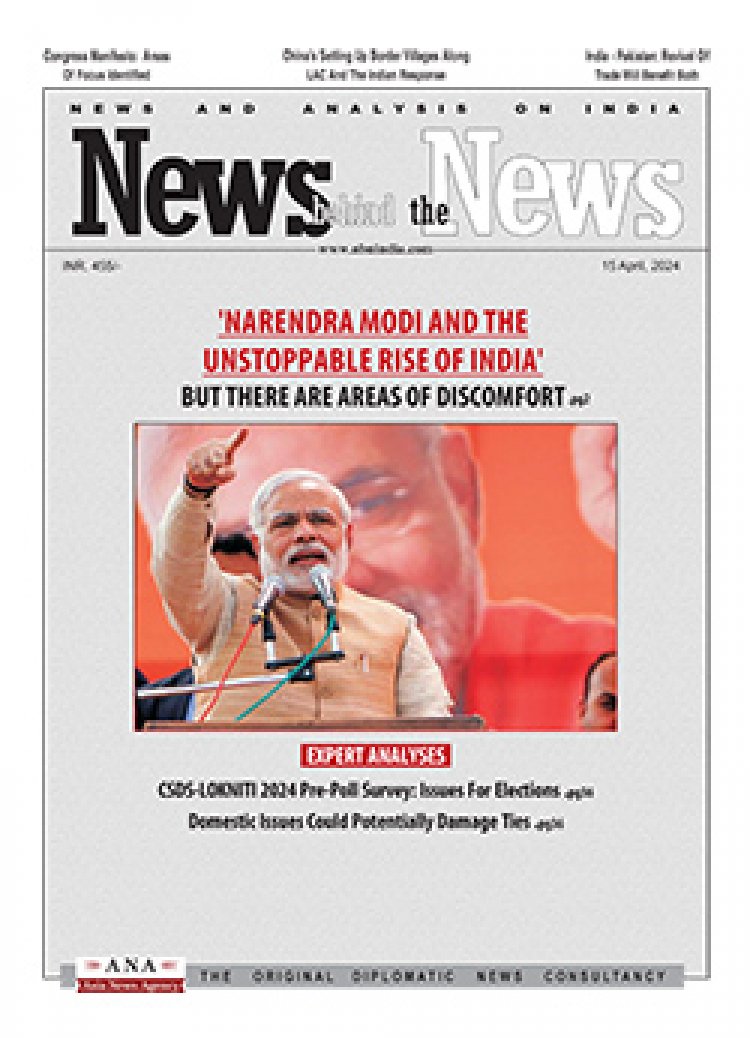India -UK: Prime Minister Boris Johnson’s Visit
STORIES, ANALYSES, EXPERT VIEWS

British Prime Minister Boris Johnson is the latest in a growing list of foreign leaders making a beeline for India against the backdrop of the Ukraine crisis, though his visit has been in the pipeline since early last year and had to be called off twice because of the Covid-19 pandemic.
The UK Prime Minister was on a two-day visit to India last week.
After the meeting with Prime Minister Narendra Modi Friday, UK PM Boris Johnson said that the relationship between the two nations is now stronger than before.
At the summit, the two sides adopted a 10-year-roadmap to expand ties in key areas of trade and economy, defence and security, climate change and people-to-people connections among others.
UK understands India’s Ukraine stand
A joint statement issued after the Modi-Johnson talks had no condemnation of Russia with the UK Prime Minister Boris Johnson Friday saying he agrees with India's stand on the Russia-Ukraine war as India has a historic relationship with Russia that everybody understands and respects. Acknowledging India's strong condemnation of what happened to Ukraine's Bucha, Boris Johnson said, “Talking to Narendra, Prime Minister Narendra Modi today made it clear that he has already intervened several times and I am sure this is no secret from our Indian (media) friends, he has talked to Vladimir Putin several times."
"What Indians want is peace and they want Russia out. And I totally agree. And I think there is a difference in balance as India has a historic relationship with Russia that everybody understands and respects that goes back decades," the UK Prime Minister said.
"What was so interesting about the last couple of days was the way in which Britain and India are being really encouraged, obliged by the pressure against autocratic coercion.. whether it's Russia or China or whatever to do more together. And that is offering a huge, huge joint agenda," the UK PM said.
PM Modi on his part, stressed on an immediate ceasefire and resolution of the problem through dialogue and diplomacy. "We also reiterated the importance of respect for the territorial integrity and sovereignty of all countries," he said.
India's stance on the ongoing Russia-Ukraine war was one of the contentious issues on the table as the UK PM talked to PM Modi and foreign minister S Jaishankar. India abstained from voting against Russia in the United Nations but has condemned the violence. At the same time, India has continued its trade with Russia. While this position of New Delhi did not go down well with the United States, Boris Johnson steered clear of any row and expressed a clear understanding of India's stand.
Foreign secretary Harsh Vardhan Shringla also maintained that there was no pressure from Boris Johnson on the Russia-Ukraine situation. "They did discuss the Ukraine issue but there was no pressure," the foreign secretary said after Johnson met PM Modi whom he called his 'khaas dost' (special friend). "Prime Minister Johnson shared his perspective on it, Prime Minister Modi shared ours - which is that the Russia-Ukraine war should end immediately. There was no pressure of any kind," the foreign secretary added.
Defence and security
In defence and security, the two Prime Ministers agreed to deepen co-operation by quickly resolving legacy issues and finalise Logistics and Training MoUs to build trust and set the stage for the Defence Ministerial Dialogue as well as begin joint work in maritime electric propulsion systems, modern fighter aircraft and jet engine advanced core technology.
Johnson said the UK is creating an Open General Export Licence (OGEL) for India to "reduce bureaucracy and slashing delivery times" for defence procurement.
The British prime minister said both sides agreed to work together to meet new threats across land, sea, air space and cyber domains and that the UK will partner with India on new fighter jet technology as well as in the maritime sphere to detect and respond to threats in the oceans.
"Today, we have agreed on a new and expanded defence and security partnership, and decades-long commitment to not only forge tighter bonds between us but to support your goal Narendra of Make in India (in defence)," Johnson said, describing Modi as his "khas dost" (special friend).
Earlier, the British high commission in a statement ahead of the Modi-Johnson talks, said Johnson is expected to discuss with PM Modi the next-generation defence and security collaboration across the five domains of land, sea, air, space and cyber as both nations face complex new threats.
This includes support for new Indian-designed and built fighter jets, offering the best of British know-how on building battle-winning aircraft and supporting India's requirements for new technology to identify and respond to threats in the Indian Ocean.
Strengthening bilateral relations in wide range of areas
Other than defence, India and the UK agreed to take their post-Brexit relationship to new heights, especially in the areas of trade, civil nuclear energy, financing climate change and improving mobility, during delegation-level talks between Prime Minister Narendra Modi and his visiting UK counterpart Boris Johnson.
The two leaders agreed to finalise agreements and oversaw the inking of MoUs that would give a fillip to intensification of India UK ties.
Free Trade Agreement by October 2022: The two leaders agreed to conclude the majority of talks on a comprehensive and balanced Free Trade Agreement (FTA) by the end of October 2022 before which they would achieve resolution of all pending market access issues in a balanced manner.
PM Modi said, "good progress" is being made in the negotiations for the FTA and that both sides have decided to do their best to close the pact by the end of this year.
Nuclear Cooperation Agreement: They also agreed upon the early conclusion of negotiations of a fresh India-UK Nuclear Cooperation Agreement to promote joint nuclear energy studies, radioactive applications, nuclear security and safety.
Critical technologies: In the area of critical technologies, a Joint India-UK Cyber Statement promised to deepen cooperation across cyber governance, deterrence and strengthen cyber resilience. They also called for increased engagements on critical and emerging domains of defence including space, Artificial Intelligence (AI) and cyber.
Indo-Pacific: PM Modi emphasised on maintaining a free, open, inclusive and rules-based order in the region and noted that India welcomed the UK's decision to join the Indo-Pacific Oceans Initiative. Besides agreeing to expand cooperation in the Indo-Pacific region, the two sides agreed upon quick finalisation of a Maritime Information Exchange Arrangement on dark and grey shipping.
Assistance for green infrastructure: Encouraged by the success of $ 425 million India-UK Green Growth Equity Fund, the UK said it will guarantee $ 1 billion World Bank lending to India’s development of green infrastructure.
Global response to future health emergencies: India and the UK also agreed to closely work together to strengthen the global response to future health emergencies and advance the ambitious plan to develop vaccines, therapeutics and diagnostics in 100 days, including on vaccine development under the framework of the Coalition for Epidemic Preparedness Innovations (CEPI) initiative.
Clean and renewable energy: The British high commission statement said Johnson will also discuss new cooperation on clean and renewable energy aimed at supporting New Delhi's energy transition from imported oil and increasing its resilience through secure and sustainable energy and addressing climate change in both the UK and India.
Hydrogen Science and Innovation hub: The high commission said the UK and India are launching a virtual Hydrogen Science and Innovation hub to accelerate affordable green hydrogen, as well as new funding for the Green Grids Initiative announced at COP26.
On aggressive Khalistani posturing in the UK
In a move that will help both sides conclusively tackle the issue of aggressive Khalistani posturing in the UK that has included the targeting of the Indian High Commission in London, India and the UK decided to set up a sub-group on countering extremism.
This group will seek to achieve consensus on taking action against groups and individuals based in UK and India who are seeking to incite violent extremism and terrorism and who are involved in financing such activities. They will set up a mechanism for exchanging information on Criminal Records, preferably before March 2023.
















